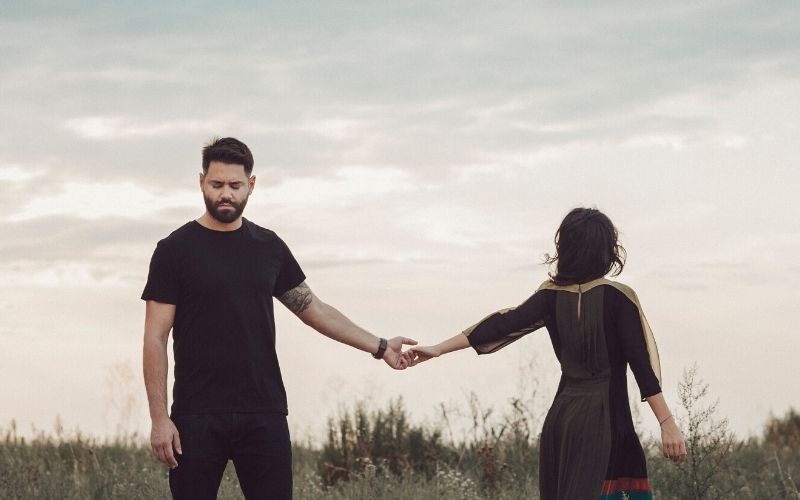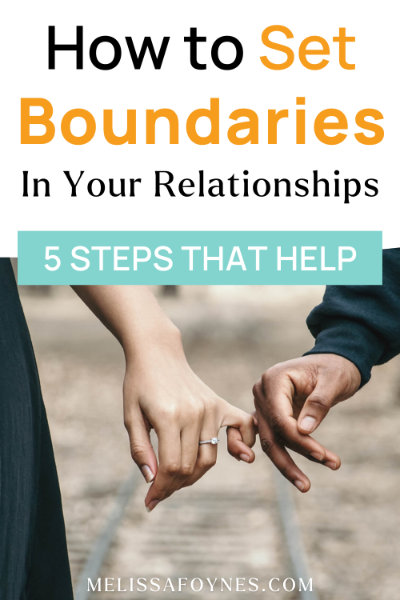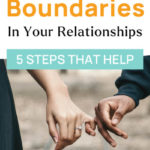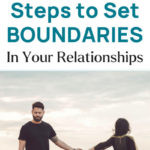welcome, I'm Melissa
Links
As a holistic coach, psychologist, mindfulness, meditation & yoga instructor, & Ayurvedic doula I offer personalized paths to growth & healing.
you may also like...
How to Set Boundaries in Relationships: 5 Steps
February 11, 2021
Setting boundaries is a necessary part of our relationships with others.
We’ve all had experiences when our buttons have been pushed. Perhaps people call or text us at inopportune times, criticize us, make comments about our habits, or give unwanted advice.

These are opportunities to practice setting healthy boundaries and observing your limits.
Allowing upsetting behavior to continue may lead to resentment and burnout in us and our relationships.
The Benefits of Setting Boundaries
Unfortunately, we often equate assertiveness with aggression, and we believe setting boundaries in our relationships involves hurting another’s feelings or being harsh.
This is simply not the case as setting boundaries in our lives has wonderful benefits:
Setting boundaries:
- Is a practice of self-care
- An act of compassion for ourselves and others.
- Prevents burnout
- Builds self-resilience, fostering a sense of empowerment and alignment with ourselves and our values
The Meaning of Setting Boundaries
Setting boundaries can also be referred to as ‘observing limits’ and this can be a positive way to think about your boundaries.
What’s the distinction?
Saying “observing limits” conveys that personal limits vary within people and across time; it’s a more nonjudgmental stance.
A limit also implies that it’s not a rigid wall or barrier – if we want, we can still remain connected to others even with limits.
Limits are unique and personal, and the process of observing them requires moment-to-moment awareness.
How Do You Know if a Boundary or Limit has been Crossed?

Think about these 3 key barometers:
- Motivation
- Effectiveness
- Emotions.
Are you less motivated or willing to be around those individuals or do things for them?
Do you avoid them or have you stopped communicating?
Do you experience emotions, such as frustration, irritation, anger, resentment and dread, or do you think, “I can’t take this anymore?”
Burnout is what happens when you’ve reached your limits mentally, emotionally and physically.
RELATED: SIGN UP TO OUR FREE 4-PART VIDEO SERIES…
THE SCIENCE AND SOUL OF BUILDING RESILIENCE
LEARN MORE HERE!
5 Steps to Setting Healthy Boundaries in Our Relationships

Let’s look at a five-step approach to setting healthy boundaries and observing limits.
This will enable you to nurture your important relationships while building healthy self-resilience.
1. Monitor Your Boundaries & Limits
Practice monitoring your boundaries in relationships and learn to identify when a boundary has been crossed.
Examples of Setting Boundaries:
Limits and boundaries can include many things, such as:
- Language
- Time
- Space
- Habits
- Money
- Unsolicited advice
- Physical touch
Figure out your signs when your limits have been crossed and be honest and nonjudgmental with yourself about your reactions.
2. Identify What the Person Has Specifically Done
Review your memory of recent interactions and ask yourself when your reaction began.
What did the other person actually do — both verbally and non-verbally — that led to your response?
This can include offensive remarks, certain phrases, tone, volume, gestures, lack of eye contact and acting disengaged.
3. Compassionately Define What You Want Them to Do Instead
Think about how the other person could respond in a way that remains within your personal limits.
In a compassionate way, communicate what you need in order to feel less frustrated and more tolerant and willing in your interactions.
4. Plan What You Want to Say
Be clear on your plan about what you want to say.
What is your goal and what outcomes do you wish to achieve?
Consider what you’d like to be different and think about reciprocity in your relationship.
Have you done at least as much for the other person as you are requesting, and are you willing to give in certain ways if the other person says yes?
5. Assert Yourself and Repeat as Needed
It’s important to be honest about your limits and compassionate toward the other person.
For some people, it’s very difficult to hear that they are doing things that annoy us. So while it is helpful to be honest and direct, it’s also important to empathize with others and try to understand their perspectives.
Remember that most of the time, we’re all doing the best we can. This stance makes it a lot easier to maintain compassion toward those who are pushing our limits.
Setting Boundaries in Relationships: Final Thoughts
There are a multitude of benefits in observing limits — particularly when observing them in a way that truly reflects our innermost needs and desires.
We can set boundaries in ways that nourish the health of our relationships and allow us to feel more confident and empowered.
Next Steps:
Give some thought to how you might notice if someone is pushing your limits.
- What are your personal warning signs and how do you relate to them?
- Do you tend to ignore these warning signs or doubt yourself?
- Perhaps you don’t notice them until things get really bad, or you communicate in a way that is really intense.
The answers to these questions may indicate that you face challenges with setting boundaries — challenges that can negatively impact your relationships and your sense of self-worth.
If you’re struggling with setting boundaries and observing limits and want to learn more about managing these dilemmas, listen to my podcast episode…
Sign Up: Free Video Coaching Series
You can also learn more about my coaching practice through this free video series: The Science & Soul of Building Resilience.
In this 4-part series you’ll learn:
- Body awareness to help us center ourselves and live in a present-focused & embodied way even in the midst of stress
- Decreasing our stress response so we can access intuition & connect to our needs
- Values clarification to guide decisions about prioritizing our time, attention, & energy
- Self-compassion to soften our harsh inner critics & facilitate growth following mistakes
SIGN UP to Get Instant Access!
MAKE SURE TO SUBSCRIBE TO THE SCIENCE & SOUL OF LIVING WELL PODCAST!
Apple | Google | Spotify | iHeart | Audible
You can also contact me or join us on Instagram – @drfoynes.
Setting Boundaries: Related Resources
Freebie Alert!
Freebie Alert!
Newsletter
Sign up to get a dose of love, inspiration, wisdom &
all the latest news on events straight to your inbox.
privacy
terms
made with ❤ by habitat society
Explore
©2022, Melissa foynes
Thank you
You're subscribed to my newsletter. Please whitelist my email to make sure you don't missing anything I send you.

